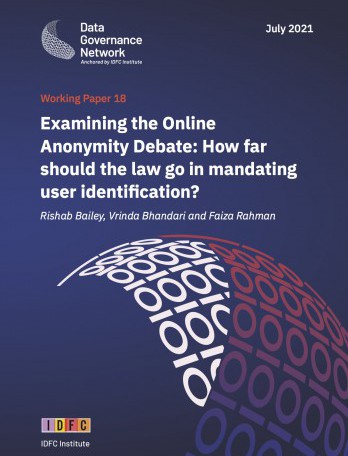

- Digital surveillance
- Regulation
- Law enforcement


Authors: Rishab Bailey, Vrinda Bhandari and Faiza Rahman
This paper explore the contours of the right to anonymity in Indian law, and its applicability to the online context. We analyse the arguments made for and against anonymity in the offline context, and demonstrate that typically, careful balancing of competing interests is required before a decision to lift the veil of anonymity. Accordingly, we argue that there should be no general prohibition on online anonymity, whether on social media or otherwise. We then analyse the recent Intermediaries Rules, 2021 that require significant social media intermediaries to (a) enable voluntary verification of users, and (b) trace the originator of information on their platforms if they provide a messaging service. We argue that voluntary verification must remain so. A de facto mandatory requirement for real-name identification, particularly through Aadhaar, could be unconstitutional. Further, a traceability requirement could have disproportionate impacts on rights to privacy and speech. The absence of adequate safeguards in the Intermediaries Rules and the presence of alternative options to trace users also render such an obligation unnecessary and disproportionate. The mere fact that law enforcement cannot always readily access the significant quantities of user data collected in the digital ecosystem cannot be a sufficient ground to bring about systemic change, which could have the cost of further moving India towards a digital surveillance state.